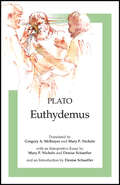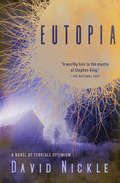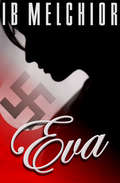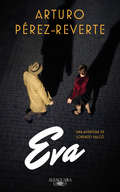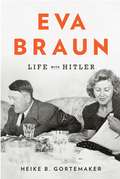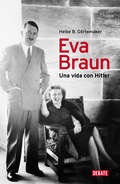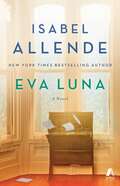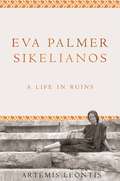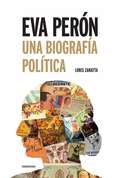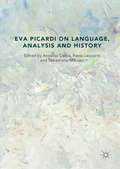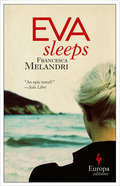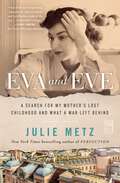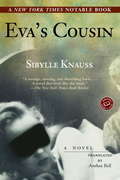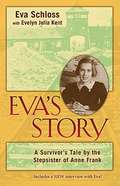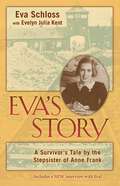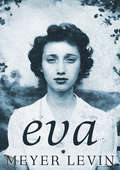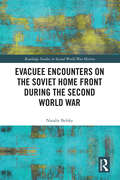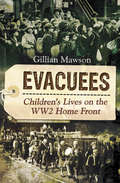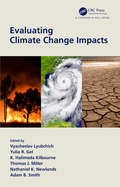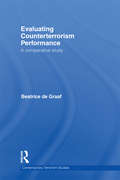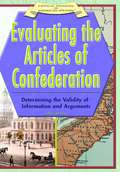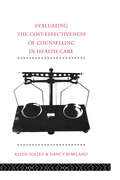- Table View
- List View
Euthydemus
by Plato Mary P. Nichols Denise Schaeffer Gregory A. McBrayerFrom the Introduction:"Neglected for ages by Plato scholars, the Euthydemus has in recent years attracted renewed attention. The dialogue, in which Socrates converses with two sophists whose techniques of verbal manipulation utterly disengage language from any grounding in stable meaning or reality, is in many ways a dialogue for our times. Contemporary questions of language and power permeate the speech and action of the dialogue. The two sophists—Euthydemus and his brother Dionysodorus—explicitly question whether speech has any connection to truth and specifically whether anything can be said about justice and nobility that cannot also be said about their opposites."Focus Philosophical Library translations are close to and are non-interpretative of the original text, with the notes and a glossary intending to provide the reader with some sense of the terms and the concepts as they were understood by Plato’s immediate audience.FeaturesNotes, glossary, and an interpretive essay.
Eutopia: A Novel of Terrible Optimism (The Book of the Juke Series #1)
by David NickleThis debut horror novel by the author of acclaimed short story collection Monstrous Affections &“establishes him as a worthy heir to the mantle of Stephen King&” (National Post). Set in 1911, Eutopia &“mixes utopian vision, rustic Americana, and pure creepiness. . . . Nickle blends Little House on the Prairie with distillates of Rosemary&’s Baby and The X-Files to create a chilling survival-of-the-fittest story&” (Publishers Weekly). Situated on the edge of the woods and mountains of northern Idaho, the tiny settlement of Eliada is an industrialist&’s attempt to create heaven on earth. But its secrets are soon to be unveiled, as Jason Thistledown, the sole survivor of a mysterious plague in Montana, and Andrew Waggoner, a black doctor nearly lynched by the KKK, delve beneath the façade of the utopian mill town. What they discover is science warped by ideology—and an unearthly monster that preys on the faith of its own true believers . . . &“A story of piano-wire suspense, grotesque horrors, and, above all, visceral insight into the race politics of American horror, and how they are bound up with the American project itself.&” —Cory Doctorow, Boing Boing Praise for David Nickle &“His stories are dark, wildly imaginative, and deeply compassionate—even when they&’re laced with righteous anger.&” —Nathan Ballingrud, author of Wounds &“David Nickle is Canada&’s answer to Stephen King. His writing charms even as it slices like a blade between the ribs: sharp, subtle, and never less than devastating.&” —Helen Marshall, author of Gifts for the One Who Comes After
Eva
by Ib MelchiorHitler&’s desperate plot to save his longtime mistress . . . Counter Intelligence Corp agent Woody Ward uncovers evidence that it might not have been Eva Braun on Hitler&’s funeral pyre. Indeed, at that very moment, Eva is being escorted along the top-secret route mapped for the escape of the Nazi elite. It is a tortuous path where disaster appears at every turn to thwart their arrival at the Italian port of Bari. Ward persuades his superiors to let him go underground and pursue Eva in an attempt to prevent her escape. The chase that ensues holds constant deadly dangers for both fugitives and pursuer, as they make their way from the eerie caves of the Harz Mountains in Germany to a startling and spectacular climax in Bari. There, a ship is waiting to carry Eva to Argentina, where she will nurture the seed of the Fourth Reich. Only CIC Agent Ward has any chance of stopping the second coming of Hitler&’s Third Reich!
Eva (Serie Falcó)
by Arturo Pérez-ReverteVuelve Arturo Pérez-Reverte con una nueva aventura de Lorenzo Falcó. «No me tengas por una de esas burguesitas perdidas entre las filas obreras. Soy una agente soviética, y tus criminales jefes fascistas podrían pedirte cuentas.» Marzo de 1937. Mientras la Guerra Civil sigue su trágico curso, una nueva misión lleva a Lorenzo Falcó hasta Tánger, turbulenta encrucijada de espías, tráficos ilícitos y conspiraciones, con el encargo de conseguir que el capitán de un barco cargado con oro del Banco de España cambie de bandera. Espías nacionales, republicanos y soviéticos, hombres y mujeres, se enfrentan en una guerra oscura y sucia en la que acabarán regresando peligrosos fantasmas del pasado. Tras el éxito internacional de Falcó, realidad y ficción vuelven a enlazarse magistralmente con el talento literario de Arturo Pérez-Reverte en esta asombrosa novela de lectura fascinante. Críticas:«Una sucesión trepidante de lances y situaciones sorprendentes contadas con firme pulso narrativo.»Ángel Basanta, El Cultural «La combinación Falcó-Tánger resulta irresistible [...]. Eva Neretva es una de las grandes creaciones femeninas de Pérez-Reverte.»Jacinto Antón, El País «La segunda aventura de Falcó supera a la primera. Al primero que seduce es a su creador, que escribe sus aventuras con el entusiasmo con que las leerá su público.»Justo Navarro, Babelia «Pocos escritores europeos saben dotar a sus novelas de un mundo propio [...]. La trama, como siempre en Pérez-Reverte, está soberbiamente narrada.»J. M. Pozuelo Yvancos, ABC Cultural «Arturo Pérez-Reverte eleva a obra maestra el cuento semanal y la novela de quiosco [...]. Sus ojos son una cámara de vídeo; su ritmo, el de las manecillas de un reloj; su limpieza, la del filo de una espada.»Raúl del Pozo, El Mundo «Una novela negra y pulp, frenética y violenta, desarrollada con amor por el lenguaje.»Edu Galán, La Nueva España «No es un libro sobre la Guerra Civil; es una historia de hombres y mujeres contada con los ojos de alguien que vivió 21 años de conflictos bélicos.»Elisabetta Rosaspina, Corriere della Sera «Falcó y Eva habrían sido prohibidos en los años cuarenta.»Jorge Fernández Díaz, La Nación «Pérez-Reverte ha impreso un nuevo e inesperado brillo al hasta ahora más bien adormilado género de espías español.»Sergio Vila-Sanjuán, Cultura/s de La Vanguardia «Magnífica Eva, superior a la ya brillante Falcó.»Juan Gómez Jurado, ABC Cultural «Eva Neretva, una loba valiente, decidida y cruel que caza en territorio hostil. Un verdugo con fe dispuesto a morir matando. La condensación en un único personaje de todas aquellas mujeres de acero que dejaron su sangre y sus nombres grabados en la historia de los frenéticos años treinta.»Victoria R. Ramos, Zenda La crítica ha dicho sobre Falcó:«Bien documentado y perfectamente trazado, Falcó refleja las muchas habilidades narrativas del autor [...]. El lector queda atrapado hasta el final, a la espera de nuevas sorpresas.»Martin Beagles, The Times Literary Supplement «Pérez-Reverte en su mejor momento. Sus novelas trazan lazos de unión unas con otras, hasta formar una urdimbre que es lo que los clásicos llamaban estilo, y los modernos, mundo.»José María Pozuelo Yvancos, ABC Cultural «Un relato vertiginoso que sujeta la atención del lector de la primera a la última página. [...] Unas vidas que representan la compleja sustancia de nuestra especie y hacen bueno el viejo dicho de que el hombre es un lobo para el hombre.»Santos Sanz Villanueva, El Cultural «El trabajo de Reverte en Falcó, una novela trepidant
Eva Braun: Life with Hitler
by Damion Searls Heike B. GortemakerIn this groundbreaking biography of Eva Braun, German historian Heike B. Görtemaker delves into the startlingly neglected historical truth about Adolf Hitler's mistress. More than just the vapid blonde of popular cliché, Eva Braun was a capricious but uncompromising, fiercely loyal companion to Hitler; theirs was a relationship that flew in the face of the Führer's proclamations that Germany was his only bride. Görtemaker paints a portrait of Hitler and Braun's life together with unnerving quotidian detail--Braun chose the movies screened at their mountaintop retreat (propaganda, of course); he dreamed of retiring with her to Linz one day after relinquishing his leadership to a younger man--while weaving their personal relationship throughout the fabric of one of history's most devastating regimes. Though Braun gradually gained an unrivaled power within Hitler's inner circle, her identity was kept a secret during the Third Reich, until the final days of the war. Faithful to the end, Braun committed suicide with Hitler in 1945, two days after their marriage. Through exhaustive research, newly discovered documentation, and anecdotal accounts, Görtemaker has meticulously built a surprising portrait of Hitler's bourgeois existence outside of the public eye. Though Eva Braun had no role in Hitler's policies, she was never as banal as she was previously painted; she was privy to his thoughts, ruled life within his entourage, and held his trust. As horrifying as it is astonishing, Eva Braun will undoubtedly be referenced in all future accounts of this period.
Eva Braun: Una vida con Hitler
by Heike B. GörtemakerLa biografía definitiva de la amante de Hitler que ofrece un retrato íntimo y paralelo de la vida del dictador nazi y del ascenso y caída del régimen que creó. Él era el Führer solitario, el hombre comprometido con una nación: Alemania. Así lo presentaba la propaganda nacionalsocialista, que no dejaba espacio posible para una relación sentimental en la vida de Hitler. Sin embargo, una mujer lo acompañó durante cerca de quince años, en las reuniones decisivas, en los peores momentos, en el Berlín asediado por los soviéticos, en la hora de su muerte. Adolf Hitler tenía una amante cuya existencia permaneció oculta hasta el final del Tercer Reich: Eva Braun. ¿Quién era la mujer con la que se casó Hitler poco antes de su caída? ¿Qué significó para ella vivir con uno de los mayores criminales de la historia? Heike B. Görtemaker ha buscado las respuestas y ha permitido a Eva Braun salir de las sombras para desvelar la intimidad de un dictador durante la época más catastrófica de la historia de Alemania. Reseñas:«Esta biografía de Frau Hitler, la más rigurosa y documentada, cambiará la idea de la rubia tonta impasible ante los asesinatos en masa.»Klaus Wiegrefe «No es posible estar más cerca de Eva Braun.»Die Welt
Eva Luna: A Novel (Jet;168-3. Bib. Isab Ser. #Vol. 168)
by Isabel Allende&“A remarkable novel&” (The Washington Post) from New York Times bestselling author Isabel Allende&’s introducing her most enchanting creation, Eva Luna: a lover, a writer, a revolutionary, and above all a storyteller.Eva Luna is the daughter of a professor&’s assistant and a snake-bitten gardener—born poor, orphaned at an early age, and working as a servant. Eva is a naturally gifted and imaginative storyteller who meets people from all stations and walks of life. Though she has no wealth, she trades her stories like currency with people who are kind to her. In this novel, she shares the story of her own life and introduces readers to a diverse and eccentric cast of characters including the Lebanese émigré who befriends her and takes her in; her unfortunate godmother, whose brain is addled by rum and who believes in all the Catholic saints and a few of her own invention; a street urchin who grows into a petty criminal and, later, a leader in the guerrilla struggle; a celebrated transsexual entertainer who instructs her in the ways of the adult world; and a young refugee whose flight from postwar Europe will prove crucial to Eva's fate. As Eva tells her story, Isabel Allende conjures up a whole complex South American nation—the rich, the poor, the simple, and the sophisticated—in a novel replete with character and incident, with drama and comedy and history, with battles and passions, rebellions and reunions, a novel that celebrates the power of imagination to create a better world.
Eva Palmer Sikelianos: A Life in Ruins
by Artemis LeontisThe first biography of a visionary twentieth-century American performer who devoted her life to the revival of ancient Greek cultureThis is the first biography to tell the fascinating story of Eva Palmer Sikelianos (1874–1952), an American actor, director, composer, and weaver best known for reviving the Delphic Festivals. Yet, as Artemis Leontis reveals, Palmer’s most spectacular performance was her daily revival of ancient Greek life. For almost half a century, dressed in handmade Greek tunics and sandals, she sought to make modern life freer and more beautiful through a creative engagement with the ancients. Along the way, she crossed paths with other seminal modern artists such as Natalie Clifford Barney, Renée Vivien, Isadora Duncan, Susan Glaspell, George Cram Cook, Richard Strauss, Dimitri Mitropoulos, Nikos Kazantzakis, George Seferis, Henry Miller, Paul Robeson, and Ted Shawn.Brilliant and gorgeous, with floor-length auburn hair, Palmer was a wealthy New York debutante who studied Greek at Bryn Mawr College before turning her back on conventional society to live a lesbian life in Paris. She later followed Raymond Duncan (brother of Isadora) and his wife to Greece and married the Greek poet Angelos Sikelianos in 1907. With single-minded purpose, Palmer re-created ancient art forms, staging Greek tragedy with her own choreography, costumes, and even music. Having exhausted her inheritance, she returned to the United States in 1933, was blacklisted for criticizing American imperialism during the Cold War, and was barred from returning to Greece until just before her death.Drawing on hundreds of newly discovered letters and featuring many previously unpublished photographs, this biography vividly re-creates the unforgettable story of a remarkable nonconformist whom one contemporary described as “the only ancient Greek I ever knew.”
Eva Perón: Una biografía política
by Loris ZanattaEl prestigioso historiador italiano, especialista en historia de Américalatina y fundamentalmente en peronismo e iglesia argentina, analiza conlucidez y valentía la herencia política que la figura de Eva Perón tuvopara el movimiento justicialista y las encrucijadas que, tras su muerte,debió enfrentar su líder, Juan Domingo Perón. Lejos de la imagen glamorosa y romántica que muchos estudios históricoscolaboraron a construir, Zanatta sostiene, por ejemplo, que la relaciónde Eva con Perón -no era de subordinación ni de dependencia, como muchosse obstinan en afirmar, sino de inevitable y creciente competencia-.Lejos también de la versión canónica sobre la caída de Perón, el autorafirma que -de ninguna manera se trató de que el régimen perdiera fuerzapor no contar ya con la presencia de ella, sino que más bien Perón cayóporque había terminado siendo el prisionero de la herencia política queella le había dejado-. Zanatta analiza un aspecto poco abordado, como esla relación de Evita con la Iglesia Católica, que, según él, funcionócomo una barrera de contención para conciliar a la clase obrera con elcristianismo y neutralizar al comunismo en la Argentina. Según él, elperonismo de Evita fue «una religión secular, con sus dogmas y susdevotos», que cuestionó en sus fundamentos más profundos las relacionesentre modernidad y tradición, política y religión, legitimidad popular ydemocracia.
Eva Picardi on Language, Analysis and History
by Annalisa Coliva Paolo Leonardi Sebastiano MoruzziThe volume honours Eva Picardi – her philosophical views and interests, as well as her teaching – collecting eighteen essays, some by former students of hers, some by colleagues with whom she discussed and interacted. The themes of the volume encompass topics ranging from foundational and historical issues in the philosophy of language and the philosophy of logic and mathematics, as well as issues related to the recent debates on rationality, naturalism and the contextual aspects of meaning. The volume is split into three sections: one on Gottlob Frege’s work – in philosophy of language and logic –, taking into account also its historical dimension; one on Donald’s Davidson’s work; and one on the contextualism-literalism dispute about meaning and on naturalist research programmes such as Chomsky’s.
Eva Sleeps
by Francesca MelandriNamed Book of the Year by Elle magazine, this “Italian love story [is] destined to become a classic” (The Gazette).Eva, a forty-year-old public relations professional living in Northern Italy, receives an unexpected message from Southern Italy. Vito, a man she briefly knew as a child as a friend of her mother’s, is very ill and would like to see her one last time. He is a retired police officer who was stationed in the north during the late sixties, a period rife with tension, protest, and violence surrounding disputed land near the border with Austria. These troubles, however, did not stop a hapless young policeman from falling in love with the “wrong” woman, a girl named Gerda from Austrian Tyrol, an inventive and accomplished cook, a northerner, the sister of a terrorist—and Eva’s mother.Vito’s affair with Gerda was a passionate one, but what was the nature of their love? And if he loved her so passionately, why did he return to Calabria? What scars did those years leave on Vito, and on Gerda? It’s time for Eva to find out, in this sweeping literary page-turner about family, forgiveness, and conflict, a bestseller in Italy now translated in English.
Eva Trout: Or The Changing Scenes (Virago Modern Classics)
by Elizabeth BowenEva Trout, Elizabeth Bowen’s last novel, epitomizes her bold exploration of the territory between the comedy of manners and cutting social commentary.Orphaned at a young age, Eva has found a home of sorts in Worcestershire with her former schoolteacher, Iseult Arbles, and Iseult's husband, Eric. From a safe distance in London, her legal guardian, Constantine, assumes that all's well. But Eva's flighty, romantic nature hasn't entirely clicked with the Arbles household, and Eva is plotting to escape. When she sets out to hock her Jaguar and disappear without a trace, she unwittingly leaves a paper trail for her various custodians–and all kinds of trouble–to follow.
Eva and Eve: A Search for My Mother's Lost Childhood and What a War Left Behind
by Julie MetzThe author of the New York Times bestselling memoir Perfection returns with an unforgettable account of her late mother&’s childhood in Nazi-occupied Austria and the parallels she sees in present-day America. To Julie Metz, her mother, Eve, was the quintessential New Yorker. Eve rarely spoke about her childhood and it was difficult to imagine her living anywhere else except Manhattan, where she could be found attending Carnegie Hall and the Metropolitan Opera or inspecting a round of French triple crème at Zabar&’s. In truth, Eve had endured a harrowing childhood in Nazi-occupied Vienna. After her mother passed, Julie discovered a keepsake book filled with farewell notes from friends and relatives addressed to a ten-year-old girl named Eva. This long-hidden memento was the first clue to the secret pain that Julie&’s mother had carried as a refugee and immigrant, shining a light on a family that had to persevere at every turn to escape the antisemitism and xenophobia that threatened their survival. Interweaving personal memoir and family history, Eva and Eve vividly traces one woman&’s search for her mother&’s lost childhood while revealing the resilience of our forebears and the sacrifices that ordinary people are called to make during history&’s darkest hours.
Eva's Cousin
by Sibylle KnaussBerchtesgaden, Germany, is a beautiful place, set among the gentle meadow-clad hills rising to the sheer heights of bare Alpine peaks. It is here where an elderly woman arrives and recollects her past--and her peripheral role in a chapter of world history. She walks along a beaten path, which has come into being because so many tourists have ventured this way . . . to see something that exists only in her memory.In the summer of 1944, twenty-year-old Marlene is thrilled when her older, more glamorous cousin, Eva Braun, Adolph Hitler's mistress, invites her to come to the Fuhrer's Bavarian mountain retreat. Against her father's wishes, Marlene accepts, and immediately sets forth to Berghof.There, while Hitler is away desperately trying to turn the tides of war, Marlene finds herself in a strange paradise, a world of opulence and imminent danger, of freedom and surveillance. The two women sneak off and skinny-dip in a nearby-lake, watch films in the Fuhrer's private cinema, and flirt with the SS officers at the dinner table--one of whom will become Marlene's first lover.Initially delighted by Eva's attentions, Marlene later tries to understand the elusive connection between her cousin and the man she loves.In quiet defiance, she begins to commit her own acts of subversion, which include listening to BBC radio broadcasts, forbidden by the Fuhrer. But a clandestine mission of mercy will force her to question her allegiance to both her cousin and her country--and to face the chilling reality that exists outside her sheltered world.Based on the true experiences of Eva Braun's cousin, Gertrude Weisker, who has shared her memories with Sibylle Knauss after more than fifty years of silence, Eva's Cousin is a novel that illuminates the banality of the domestic face of evil. It casts a special light on the profound questions of innocence and complicity that still haunt much of the world today.From the Hardcover edition.
Eva's Story: A Survivor's Tale by the Stepsister of Anne Frank
by Eva Schloss Evelyn Julia KentMany know the tragic story of Anne Frank, the teen whose life ended at Auschwitz during the Holocaust. But most people don’t know about Eva Schloss, Anne’s playmate and stepsister. Though Eva, like Anne, was taken to Auschwitz at the age of 15, her story did not end there. / This incredible memoir recounts — without bitterness or hatred —the horrors of war, the love between mother and daughter, and the strength and determination that helped a family overcome danger and tragedy.
Eva's Story: A Survivor's Tale by the Stepsister of Anne Frank
by Eva Schloss Evelyn Julia KentMany know the tragic story of Anne Frank, the teen whose life ended at Auschwitz during the Holocaust. But most people don&’t know about Eva Schloss, Anne&’s playmate and stepsister. Though Eva, like Anne, was taken to Auschwitz at the age of 15, her story did not end there. / This incredible memoir recounts — without bitterness or hatred —the horrors of war, the love between mother and daughter, and the strength and determination that helped a family overcome danger and tragedy.
Eva: A Novel of the Holocaust (A\jewish Legacy Book Ser.)
by Meyer LevinEva: A Novel of the Holocaust, first published in 1959, is a fictionalized account of Ida Loew, a young Jewish girl from Poland who survived the Jewish pogroms of the Nazis and the Auschwitz camp. The book opens with the girl at age 16 leaving her home in southeastern Poland and posing as a gentile from the Ukraine named Katya. The story follows Eva as she works as a maid in the home of a prominent Austrian family in Linz (the husband is an SS officer), and then as an office worker in a German munitions factory. When she is eventually discovered to be a Jew, she is sent to Auschwitz. After the evacuation of the camp she manages to escape, finding refuge with a Polish family. At the end of the novel she is trying to find her family and home, difficult because so many Jewish communities in Eastern Europe had been destroyed. In real life, Ida Loew made her way to Israel after the war where she settled in Tel Aviv.
Evacuee Encounters on the Soviet Home Front During the Second World War (Routledge Studies in Second World War History)
by Natalie BelskyThis study is the first to examine the experiences of the millions of Soviet civilians evacuated to the interior of the country during the Second World War in the context of their encounters and relations with local communities and populations across Soviet Central Asia, Kazakhstan, Siberia, and the Urals. The book considers the impact of this episode of massive population displacement across Eurasia on individuals, communities, and society more broadly. It explores how the challenges associated with wartime displacement gave rise to tensions between evacuees and local residents. These frictions, in turn, forced individuals to interrogate the meaning, terms, and limitations of citizenship and belonging in the Soviet Union. Evacuation thus played a critical role in the changing relationship between citizens and the Soviet state in the war and postwar periods. Furthermore, this study pays particular attention to the plight of Soviet Jewish evacuees, who constitute the largest contingent of Holocaust survivors in Europe, and the rise of anti-Semitism on the Soviet home front during the war. This volume will be of interest to students and scholars of the Second World War, migration and displacement, the Holocaust, Soviet Jewish history, and the Soviet experience more broadly.
Evacuees: Children's Lives on the WW2 Home Front
by Gillian MawsonOn the outbreak of the Second World War, during the first week of September 1939 over three million people were evacuated. Operation Pied Piper was the largest ever transportation of people across Britain, and most of those moved to safety in the countryside were schoolchildren. Social historian Gillian Mawson has spent years collecting the stories of former evacuees and this book includes the personal memories of over 100, in their own words. Their accounts reveal what it was like to settle into a new home with strangers, often staying for years. While many enjoyed life in the countryside, some escaping inner-city poverty, others endured ill-treatment and homesickness.A fascinating insight into the realities of wartime life, and a valuable oral history of a unique moment in British history.
Evagrius Ponticus (The Early Church Fathers)
by Augustine CasidayPresenting many texts available for the very first time, this new volume in the successful Early Church Fathers series showcases full translations of Evagrius' letters, notes on various books of the bible, his treatises and his 'chapters'. Augustine Casiday's material is both accurate and refreshingly approachable, and the work is prefaced by a solid introductory essay that presents Evagrius, his work and influences, and modern scholarship in an easy-to-understand way for beginners. For students dealing with Evagrius for the first time, they could not find a better book to begin their exploration of this figure in late-ancient history and theology.
Evaluating Climate Change Impacts (Chapman And Hall/crc Applied Environmental Statistics Ser.)
by Vyacheslav Lyubchich, Yulia R. Gel, K. Halimeda Kilbourne, Thomas J. Miller, Nathaniel K. Newlands and Adam B. SmithEvaluating Climate Change Impacts discusses assessing and quantifying climate change and its impacts from a multi-faceted perspective of ecosystem, social, and infrastructure resilience, given through a lens of statistics and data science. It provides a multi-disciplinary view on the implications of climate variability and shows how the new data science paradigm can help us to mitigate climate-induced risk and to enhance climate adaptation strategies. This book consists of chapters solicited from leading topical experts and presents their perspectives on climate change effects in two general areas: natural ecosystems and socio-economic impacts. The chapters unveil topics of atmospheric circulation, climate modeling, and long-term prediction; approach the problems of increasing frequency of extreme events, sea level rise, and forest fires, as well as economic losses, analysis of climate impacts for insurance, agriculture, fisheries, and electric and transport infrastructures. The reader will be exposed to the current research using a variety of methods from physical modeling, statistics, and machine learning, including the global circulation models (GCM) and ocean models, statistical generalized additive models (GAM) and generalized linear models (GLM), state space and graphical models, causality networks, Bayesian ensembles, a variety of index methods and statistical tests, and machine learning methods. The reader will learn about data from various sources, including GCM and ocean model outputs, satellite observations, and data collected by different agencies and research units. Many of the chapters provide references to open source software R and Python code that are available for implementing the methods.
Evaluating Counterterrorism Performance: A Comparative Study (Contemporary Terrorism Studies)
by Beatrice de GraafThis book offers a new model for measuring the success and impact of counterterrorism strategies, using four comparative historical case studies. The effectiveness of counterterrorism measures is hard to assess, especially since the social impact of terrorist attacks is a fundamental and complex issue. This book focuses on the impact of counterterrorist measures by introducing the concept of the performative power of counterterrorism: the extent to which governments mobilize public and political support - thereby sometimes even unwittingly assisting terrorists in creating social drama. The concept is applied to counterterrorism in the Netherlands, Italy, the Federal Republic of Germany and the United States in the 1970s. Based on in-depth case study research using new primary sources and interviews with counterterrorist officials and radicals, a correlation is established between a low level of performative power and a decline of terrorist incidents. This is explored in terms of the link between social drama (as enhanced by counterterrorist measures) and ongoing radicalization processes. This book demonstrates that an increase in visible and intrusive counterterrorist measures does not automatically lead to a more effective form of counterterrorism. In the open democracies of the west, not transforming counterterrorism into a performance of power and repression is at least as important as counterterrorism measures themselves. This book will be of much interest to students of terrorism and counter-terrorism, discourse analysis, media and communication studies, conflict studies and IR/Security Studies in general.
Evaluating Empire and Confronting Colonialism in Eighteenth-Century Britain
by Jack P. GreeneThis volume comprehensively examines how metropolitan Britons spoke and wrote about the British Empire during the short eighteenth century, from about 1730 to 1790. The work argues that following several decades of largely uncritical celebration of the empire as a vibrant commercial entity that had made Britain prosperous and powerful, a growing familiarity with the character of overseas territories and their inhabitants during and after the Seven Years' War produced a substantial critique of empire. This critique evolved out of a widespread revulsion against the behaviours exhibited by Britons overseas and built on a language of 'otherness' that metropolitans had used since the beginning of overseas expansion to describe its participants, the societies and polities that Britons abroad constructed in their new habitats. It used the languages of humanity and justice as standards to evaluate and condemn the behaviours of both overseas Britons and subaltern people in the British Empire, whether in India, the Americas, Africa or Ireland.
Evaluating the Articles of Confederation: Determining the Validity of Information and Arguments (Critical Thinking in American History)
by Greg RozaThis is a fascinating look at the state of the nation at the time of the drafting of the Articles of Confederation seen against the backdrop of revolution, the various ideological debates and practical considerations that shaped it, and the document's inherent weaknesses that necessitated its replacement with the Constitution.
Evaluating the Cost-Effectiveness of Counselling in Health Care
by Nancy Rowland Keith TolleyLimited resources in health care mean that the value of counselling is decided in a highly competitive economic arena. Keith Tolley and Nancy Rowland have written a practical guide to the basic principles of evaluating cost-effectiveness to enable counsellors and service providers to carry out analysis for themselves. They provide helpful definitions of technical terms and use case studies to demonstrate how to apply the theory in different contexts.
